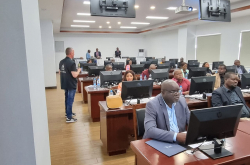This project will implement structured message formats to improve the consistency of information exchanged, the quality and quantity of hits and leads, and the speed of follow-up.
The challenges
Member countries exchange more than 28 million free-text messages every year via INTERPOL’s secure global communication system, I-24/7.
Messages are exchanged between National Central Bureaus (NCBs), the INTERPOL General Secretariat and other authorized law enforcement agencies.
For most NCBs, messages have to be dispatched and categorized manually. Connectivity can also be a challenge. Information is sometimes lost, responses delayed, and input errors may affect the quality of hit follow-up and international police cooperation.
How it will work
NEXUS is a web-based messaging platform that applies artificial intelligence to help make police messaging more effective, and to improve the quality and quantity of hits and leads.
Structured messages will present information in an easy-to-find and time-efficient manner. Law enforcement and border officials working in the field will be equipped with the necessary intelligence faster, leading to more arrests and/or successful resolution of situations.
NEXUS can be integrated with other existing systems, including national case management solutions, in order to reduce the risk of information loss, maximize information exchange and facilitate hit follow-up.
The solution will benefit all National Central Bureaus and authorized law enforcement agencies in INTERPOL member countries.
NEXUS is being shaped by its future users. Member countries have actively participated in the platform’s development at early stages and provided feedback so that the tool could be tailored to their needs.. This involvement of member country experts will continue with the evolution of the NEXUS.
Operational benefits
The project will:
- Provide structured law enforcement messaging and reliable case communication;
- Improve the accuracy and quality of data;
- Lower the risk of information loss and technical errors;
- Improve the searching, extraction and archiving of information;
- Use artificial intelligence to provide relevant and comprehensive information to the user;
- Allow interoperability with national systems;
- Maximize investigative leads and foster international police cooperation;
- Contribute to solving more cases of transnational crime.
See also
Related news

Breakthrough in longstanding Dutch missing person case
11 October 2024
INTERPOL welcomes new DNA legislation in Belgium
11 April 2024
Border security threats focus of STOP operations in Africa
8 December 2023





